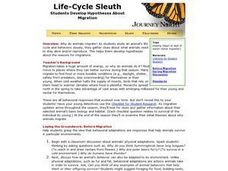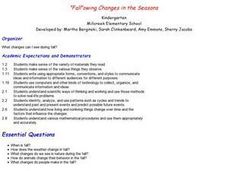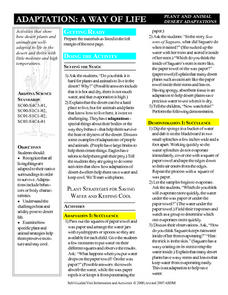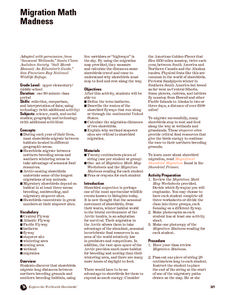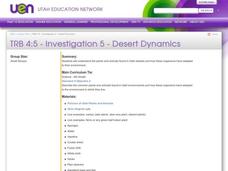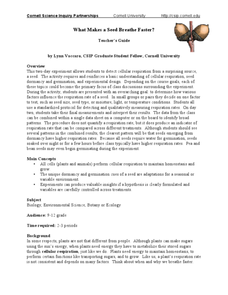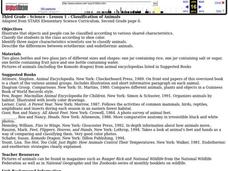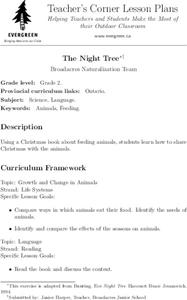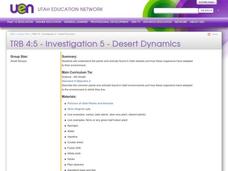Curated OER
Life-Cycle Sleuth
Students analyze an animal's life cycle and behaviors, and examine what animals need to stay alive and reproduce. They develop theories and hypotheses about the reasons for migrations, using the Journey North online project.
Curated OER
Climatic Zones
Third graders recognize and locate Frigid, Temperate, and Torrid climatic zones on the word map or globe. They explain that plants, animals, and human societies display adaptations to the climates they live in .
Curated OER
"Fall"owing Changes in the Season
Students create a whole class A-B-"C"eason Book. Each student is responsible for creating a "letter" page relating to changes, adaptations, or other fall concepts. After hard copies of the class ABC books are created, the teachers using...
Prince William Network
The Incredible Journey
Divide your school gym into breeding grounds and non-breeding grounds so that your zoologists can play a game simulating the seasonal migration of shorebirds. Players pick one of the included game cards and follow its directions, which...
Curated OER
Animals, Soil, Trees
Fourth graders describe the various kinds of soils and how plants and animals are affected by them. They describe the baic needs of plants, scoring at least a 3 or 4 on a 4-point rubic. Students are able to predict and/or infer what...
Curated OER
Desert Habitat
Students examine how desert plants and animals are adapted to life in the desert. They listen to the book, "Seasons of Saguaro," conduct experiments to demonstrate plant succulence, and create and draw an animal or plant that...
Prince William Network
Migration Math Madness
A great way to incorporate math into life science, this instructional activity has learners measure migratory routes on a map and calculate the actual distance that shorebirds on the routes would cover. Learners compute the distance...
Curated OER
Desert Dynamics
Students investigate the plants and animals found in Utah deserts and how these organisms have adapted to their environment. They brainstorm ways that desert plants are different from or similar to wetland plants.
Curated OER
A Visit to a North Carolina Museum
Students visit the North Carolina Aquariums website and gather the information requested to complete a worksheet. They use this information to write a story about their imaginary trip.
Curated OER
A Walk in the Tundra
Discuss the environment of the Arctic tundra using this resource. The focus of this lesson is the story A Walk in the Tundra by Rebecca L. Johnson. The appealing illustrations are bound to captivate your class! After reading the...
Curated OER
Comparison of Snow Cover on Different Continents
Students use the Live Access Server (LAS) to form maps and a numerical text file of snow cover for each continent on a particular date and analyze the data for each map, corresponding text file to determine an estimate of snow cover for...
Curated OER
Wetland Adaptation
Fourth graders study the impact of the wetland environment on the migration of birds. They make a list of the important reasons on a large piece of paper to be posted in the classroom and point out the biggest wetland in the state (The...
Curated OER
Habitat Basics
First graders get out and explore two different habitats to examine how each one meets the needs of the plants and animals that dwell there. They discuss what they've learned about animal habitats as they explore the outdoor environment....
Curated OER
What Makes a Seed Breathe Faster?
Here's a five-star lesson plan in which inquisitors conduct sophisticated experimentation with cellular respiration in plant seeds. Placing seeds in a closed system they measure the amount carbon dioxide produced and relate it to...
Curated OER
Habitat for Sale
Students are able to define habitat, and identify the four things that living things need to survive. They are able to describe how living things are adapted to their habitats.
Curated OER
Holy Habitats or Meet Metamorphosis
Young scholars examine the metamorphosis of frogs and how it adapts to its environment. They research how world pollutants are effecting the amphibian population.
Curated OER
Classification of Animals
Third graders practice classiyfying items and identify three major characteristics scientists use to classify animals. They describe the differences between ectothermic and endothermic animals.
Curated OER
The Night Tree
Second graders explore the book, Night Tree, by Eve Bunting. They read and discuss the story, identify what the tree did for the animals, create a food chain for animals to hang on a tree, and decorate a tree at school.
Curated OER
Prairie Mural Project
Seventh graders construct a large mural of a praire showing plants, and animals that would live there.
Curated OER
Birds and Coffee
Fifth graders identify the changing seasons with how they affect animal and human behavior. They explain what migration is and why many birds migrate south for the winter. They then trace the coffee sold in their neighborhood and in...
Curated OER
Mammals, Mammals--Everywhere!
Students explore the habitats of mammals and their physical characteristics. They research examples of mammals that must deal with daily changes in their habitat and how they cope with them. In small groups, students create a table...
Curated OER
Pollination Power
Students go out into the garden and observe pollinating animals through hand lenses. In this pollination lesson plan, students also discuss how animals carry seeds to create new plants elsewhere.
Curated OER
A Sea Turtle Experience
Students observe live green sea turtles and use their imagination to form questions about the animals. They present these questions to their teacher. Students then complete the activity sheets highlighting sea turtle biology and...
Curated OER
Desert Dynamics
Fourth graders examine the various types of plants and animals found in the deserts of Utah. In groups, they discover how the plants and animals have adapted to the harsh environment. To end the lesson, they compare and contrast the...
